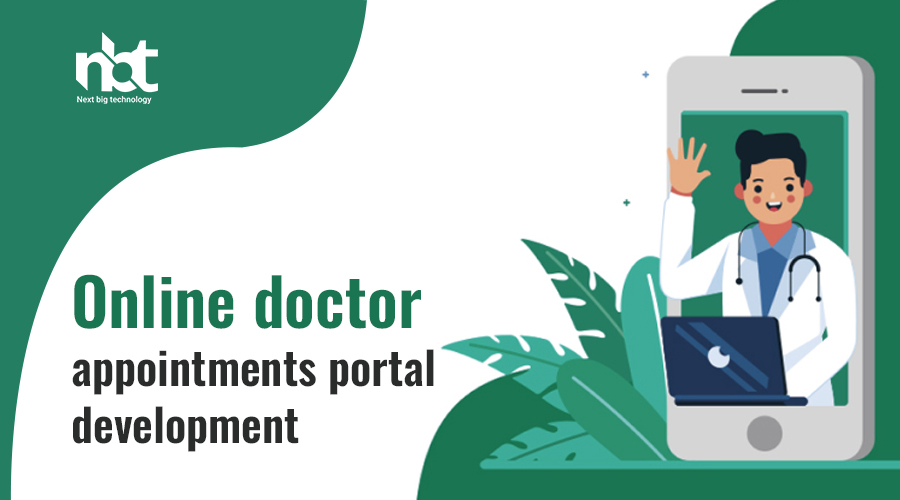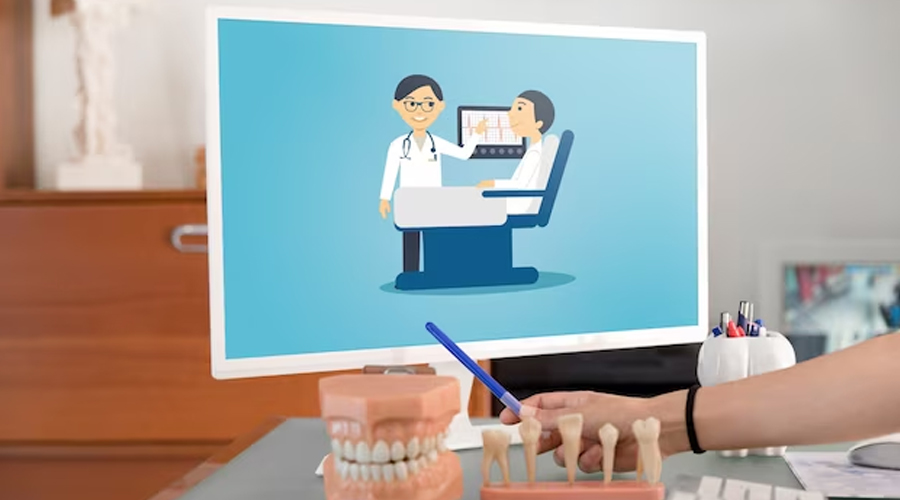Table of Contents
Online doctor appointments portal development Services
In today’s fast-paced world, where convenience is key, the healthcare industry is also evolving to meet the needs of patients who seek instant access to medical services. Online doctor appointment portals have emerged as a game-changer, providing a convenient solution for patients to schedule appointments with healthcare providers from the comfort of their homes. As the demand for such services continues to rise, the development of online doctor appointment portals has become increasingly crucial for healthcare providers.
Online doctor appointment portal development services offer a range of benefits for both healthcare providers and patients alike. Let’s delve into the advantages of embracing this innovative technology:
- Enhanced Accessibility: With online doctor appointment portals, patients can easily access healthcare services anytime, anywhere. Whether they are at home, work, or on the go, patients can schedule appointments with just a few clicks, eliminating the need to wait on hold or visit the doctor’s office in person.
- Time Efficiency: Traditional appointment scheduling methods often involve long wait times and administrative hassles. Online doctor appointment portals streamline the process, allowing patients to schedule appointments at their convenience, thereby saving time for both patients and healthcare providers.
- Improved Patient Engagement: By offering online appointment scheduling options, healthcare providers can engage with patients more effectively. Patients appreciate the convenience of being able to book appointments online, leading to increased patient satisfaction and loyalty.
- Reduced No-Shows: Missed appointments can be costly for healthcare providers and frustrating for patients. Online appointment portals can help reduce the number of no-shows by sending appointment reminders and allowing patients to easily reschedule appointments if needed.
- Efficient Resource Management: By automating appointment scheduling and administrative tasks, online doctor appointment portals enable healthcare providers to allocate their resources more efficiently. This leads to better workflow management and improved overall productivity.
- Data Security and Compliance: Online doctor appointment portals prioritize the security and privacy of patient data. With robust encryption and compliance measures in place, patients can trust that their personal information is safe and protected.
- Integration with Electronic Health Records (EHR): Many online appointment portals seamlessly integrate with EHR systems, allowing healthcare providers to access patient records and streamline the appointment process further. This integration enhances continuity of care and ensures that healthcare providers have access to relevant patient information during appointments.
How to Create a Online doctor appointments portal development
In today’s fast-paced world, the demand for convenient healthcare services is on the rise. With the advancement of technology, people are increasingly turning to online platforms to book doctor appointments, saving time and effort. If you’re considering developing an online doctor appointments portal, you’re stepping into a promising realm of healthcare technology. Here’s a comprehensive guide to help you navigate through the process:
- Market Research: Before diving into development, conduct thorough market research. Identify your target audience, analyze competitors, and understand the unique needs and preferences of your potential users.
- Define Objectives: Clearly outline the objectives of your online portal. Determine whether you’re focusing on a specific medical specialty, catering to a particular demographic, or offering general healthcare services.
- Choose the Right Features: Decide on the features you want to include in your portal. Essential features may include user registration, doctor profiles, appointment scheduling, secure payment integration, real-time chat support, and a user-friendly interface.
- Select a Development Approach: You can either opt for custom development from scratch or use existing platforms and customize them according to your requirements. Consider factors like scalability, security, and time-to-market while choosing the development approach.
- User Experience Design: Design an intuitive user interface that ensures seamless navigation and a pleasant user experience. Keep the design simple, yet visually appealing, and prioritize mobile responsiveness for accessibility across various devices.
- Backend Development: Develop a robust backend system to handle user data, appointments, payments, and communication channels securely. Implement features like appointment reminders, patient history tracking, and feedback mechanisms to enhance user engagement.
- Integration of Telemedicine Services: With the growing popularity of telemedicine, consider integrating video consultation and telehealth services into your portal. Ensure compliance with healthcare regulations and prioritize data privacy and security.
- Testing and Quality Assurance: Conduct thorough testing to identify and rectify any bugs or usability issues. Perform rigorous security testing to safeguard sensitive patient information and ensure regulatory compliance.
- Launch and Marketing: Once development and testing are complete, launch your portal and implement a robust marketing strategy to attract users. Utilize social media, content marketing, and partnerships with healthcare providers to increase visibility and drive user adoption.
- Continuous Improvement: Listen to user feedback and continuously iterate on your portal to enhance its functionality and user experience. Stay updated with the latest trends and technologies in healthcare and incorporate relevant advancements into your platform.
Why Should You Go for Online doctor appointments portal development
In today’s fast-paced world, technology continues to revolutionize various aspects of our lives, including the way we access healthcare services. With the rise of online doctor appointments portals, the traditional method of scheduling appointments by phone or in person is gradually becoming obsolete. Instead, individuals are turning to the convenience and efficiency offered by online platforms to book appointments with healthcare professionals. If you’re still hesitant about embracing this digital transformation, here are some compelling reasons why you should consider investing in online doctor appointments portal development:
- Accessibility and Convenience: One of the primary advantages of online doctor appointments portals is the convenience they offer to patients. Rather than waiting on hold or trying to find time to visit a clinic in person, individuals can easily book appointments from the comfort of their homes or on the go. This accessibility ensures that healthcare services are readily available to patients, regardless of their location or schedule.
- Time Efficiency: Online doctor appointments portals streamline the appointment scheduling process, saving both patients and healthcare providers valuable time. With just a few clicks, patients can view available time slots, choose a suitable appointment time, and confirm their booking—all without the need for lengthy phone calls or administrative delays. Similarly, healthcare professionals can efficiently manage their schedules and allocate their time more effectively, leading to improved productivity and patient care.
- Reduced Administrative Burden: By digitizing the appointment booking process, online portals help alleviate the administrative burden on healthcare staff. With automated appointment reminders, confirmation notifications, and integration with electronic health records (EHR) systems, administrative tasks are simplified, allowing staff to focus on delivering quality care to patients rather than managing appointments manually.
- Enhanced Patient Experience: Online doctor appointments portals contribute to a positive patient experience by offering a user-friendly interface and seamless booking process. Patients appreciate the convenience of being able to schedule appointments at their convenience, without the frustration of long wait times or scheduling conflicts. Additionally, features such as online payment options, telemedicine consultations, and appointment reminders enhance patient satisfaction and engagement with healthcare services.
- Improved Efficiency and Resource Utilization: By adopting online doctor appointments portals, healthcare facilities can optimize resource utilization and improve overall efficiency. With real-time visibility into appointment schedules, staff can better manage patient flow, allocate resources effectively, and minimize appointment no-shows or cancellations. This results in a more efficient use of staff time, reduced wait times for patients, and ultimately, a more cost-effective healthcare delivery system.
- Adaptation to Changing Patient Preferences: As digital technology continues to evolve, patients are increasingly seeking convenient and accessible healthcare solutions. Investing in online doctor appointments portal development demonstrates a commitment to meeting these evolving patient preferences and staying ahead of the curve in healthcare delivery. By embracing innovation and leveraging technology, healthcare providers can attract and retain patients while remaining competitive in the ever-changing healthcare landscape.
Market Prospects of Online doctor appointments portal development and Platforms
In recent years, the healthcare industry has undergone a significant transformation, largely fueled by technological advancements. One such innovation that has revolutionized the way patients access healthcare services is the development of online doctor appointment portals and platforms. These platforms offer a seamless and convenient way for patients to schedule appointments with healthcare professionals, bypassing the traditional hassles of long waiting times and phone calls. As the demand for efficient healthcare services continues to rise, the market prospects for online doctor appointments portal development and platforms are increasingly promising.
The primary driving force behind the growing popularity of online doctor appointment platforms is the increasing digitalization of healthcare services. With the widespread availability of smartphones and high-speed internet connectivity, patients now have the ability to access healthcare services from the comfort of their own homes. This convenience factor is a major draw for patients, especially those with busy schedules or limited mobility.
Moreover, online doctor appointment portals offer several advantages for healthcare providers as well. These platforms streamline the appointment scheduling process, reducing administrative overhead and freeing up staff time to focus on patient care. Additionally, they provide valuable data insights that can help healthcare providers better understand patient needs and preferences, leading to improved service delivery and patient satisfaction.
From a business perspective, the market potential for online doctor appointment portal development is substantial. With an increasing number of healthcare providers recognizing the benefits of digitizing their services, there is a growing demand for customizable and scalable appointment booking solutions. This presents a lucrative opportunity for software developers and technology companies specializing in healthcare IT solutions.
Furthermore, the COVID-19 pandemic has accelerated the adoption of telehealth services, including online doctor appointments. With social distancing measures in place and concerns about virus transmission, many patients have turned to virtual consultations as a safer alternative to in-person visits. This shift in patient behavior has further underscored the importance of online doctor appointment portals and platforms in modern healthcare delivery.
In terms of market segmentation, online doctor appointment portal development caters to a diverse range of stakeholders, including hospitals, clinics, individual practitioners, and healthcare networks. Each segment has unique requirements and preferences, creating opportunities for specialized solutions tailored to specific niches within the healthcare industry.
To capitalize on the growing demand for online doctor appointment portals, developers must prioritize user experience, security, and interoperability with existing healthcare systems. Building trust and credibility among both patients and healthcare providers is essential for the long-term success of these platforms.
Essential Features of a Online doctor appointments portal development
In today’s fast-paced world, convenience is paramount, especially when it comes to healthcare services. With the advent of technology, the traditional method of scheduling doctor appointments over the phone or in person has evolved into a seamless online experience. An online doctor appointments portal serves as a bridge between patients and healthcare providers, facilitating efficient scheduling, reducing wait times, and enhancing overall patient experience. To ensure the success of such a portal, several essential features must be incorporated into its development.
- User-Friendly Interface: A user-friendly interface is crucial for attracting and retaining users. The portal should be intuitive, easy to navigate, and responsive across various devices such as smartphones, tablets, and desktops. Clear and concise instructions should guide users through the appointment scheduling process, minimizing confusion and frustration.
- Secure Patient Information Management: Privacy and security are paramount when dealing with sensitive patient information. The portal must comply with healthcare regulations such as HIPAA to safeguard patient data. Implementing robust encryption protocols and access controls will help prevent unauthorized access and ensure patient confidentiality.
- Comprehensive Search Functionality: A robust search functionality is essential for patients to find suitable healthcare providers based on their specialty, location, availability, and other relevant criteria. Filters and sorting options can further streamline the search process, allowing patients to quickly identify and schedule appointments with their preferred doctors.
- Real-Time Appointment Scheduling: The ability to schedule appointments in real-time is a fundamental feature of any online doctor appointments portal. Patients should be able to view the availability of healthcare providers in real-time and book appointments accordingly. Integration with the providers’ scheduling systems can ensure that appointment slots are updated promptly, reducing the risk of double bookings.
- Automated Appointment Reminders: To minimize no-shows and last-minute cancellations, the portal should send automated appointment reminders to patients via email or SMS. Reminders can include appointment details, directions to the healthcare facility, and any pre-appointment instructions. Customizable reminder settings allow patients to choose their preferred method and frequency of reminders.
- Telemedicine Integration: Telemedicine has become increasingly popular, especially in light of recent global events. Integrating telemedicine capabilities into the portal allows patients to schedule virtual appointments with healthcare providers from the comfort of their homes. Features such as video consultations, secure messaging, and electronic prescriptions enhance accessibility and convenience for both patients and providers.
- Feedback and Reviews: Providing patients with the opportunity to leave feedback and reviews after their appointments can help improve the quality of care and enhance patient satisfaction. A feedback mechanism within the portal allows patients to rate their experience, provide comments, and share any suggestions for improvement. Healthcare providers can use this feedback to address concerns, make necessary adjustments, and build trust with their patients.
Advanced Features Online doctor appointments portal development
In the ever-evolving landscape of healthcare, the convenience and efficiency of online doctor appointment portals have become indispensable. These platforms streamline the process of scheduling appointments, reducing wait times, and enhancing patient satisfaction. As technology continues to advance, so do the features and capabilities of these portals. In this article, we’ll delve into some of the advanced features that are transforming the landscape of online doctor appointment portals.
- Customized Appointment Scheduling: One of the key features of advanced online doctor appointment portals is the ability to offer customized scheduling options. Patients can specify their preferred date, time, and even the healthcare provider they wish to see. This level of customization not only enhances user experience but also improves appointment adherence and reduces no-show rates.
- Integration with Electronic Health Records (EHR): Integration with EHR systems allows for seamless access to patient records, medical history, and treatment plans. This integration ensures that healthcare providers have all the necessary information at their fingertips during appointments, leading to more informed decision-making and better patient outcomes.
- Telemedicine Capabilities: With the growing popularity of telemedicine, advanced appointment portals now offer integrated video conferencing features. Patients can schedule virtual appointments with their healthcare providers, eliminating the need for in-person visits for certain types of consultations. This feature is especially valuable for patients in remote areas or those with mobility issues.
- Automated Appointment Reminders: To reduce the likelihood of missed appointments, advanced portals utilize automated appointment reminder systems. Patients receive reminders via email, SMS, or push notifications, helping them stay on track with their healthcare appointments and improving overall appointment adherence.
- Patient Feedback and Reviews: Feedback and review mechanisms allow patients to share their experiences and provide valuable insights into the quality of care they received. Advanced appointment portals incorporate features for collecting patient feedback, which can be used to enhance service quality and improve patient satisfaction levels.
- Multi-platform Accessibility: In today’s digital age, patients expect convenience and accessibility across various devices. Advanced appointment portals are optimized for multi-platform access, ensuring a seamless experience whether accessed via desktop, laptop, tablet, or smartphone. This flexibility allows patients to schedule appointments anytime, anywhere, enhancing convenience and accessibility.
- Integration with Insurance Providers: Integration with insurance providers’ systems enables patients to check their insurance coverage, verify eligibility, and even submit claims directly through the appointment portal. This integration streamlines the administrative process, reduces paperwork, and ensures smooth reimbursement for both patients and healthcare providers.
- Real-time Wait Time Updates: Waiting times can be a significant source of frustration for patients. Advanced appointment portals offer real-time updates on wait times, allowing patients to plan their arrival accordingly or opt for virtual waiting options. This feature helps reduce patient anxiety and enhances overall satisfaction with the healthcare experience.
Online doctor appointments portal development Timelines
In today’s fast-paced world, technology continues to revolutionize the way we access healthcare services. One such innovation is the advent of online doctor appointment portals, which streamline the process of scheduling appointments, reducing waiting times, and enhancing overall patient experience. For healthcare providers and entrepreneurs looking to embark on the journey of developing such a portal, understanding the timelines involved is crucial for success.
- Conceptualization: The journey begins with conceptualization. Define the objectives, target audience, features, and functionalities of the portal. Conduct market research to identify gaps and opportunities. This phase sets the foundation for the entire project.
- Requirement Analysis: Gather detailed requirements through consultations with healthcare professionals, patients, and IT experts. Document the specifications, including user roles, appointment scheduling process, payment integration, security measures, etc. This step ensures clarity and alignment among stakeholders.
- Design & Prototyping: Create wireframes and design prototypes based on the requirements. Focus on user interface (UI) and user experience (UX) design to ensure intuitive navigation and seamless interaction. Iterate on the designs based on feedback from stakeholders to refine the concept.
- Development: This phase involves actual coding and development of the portal. Choose a suitable technology stack and framework based on scalability, security, and performance requirements. Implement features such as appointment booking, real-time notifications, patient records management, and integration with existing healthcare systems.
- Testing: Thoroughly test the portal for functionality, usability, security, and performance. Conduct different types of testing, including unit testing, integration testing, and user acceptance testing (UAT). Address any bugs or issues identified during testing promptly to ensure a smooth user experience.
- Deployment & Launch: Prepare for deployment by setting up hosting infrastructure, configuring servers, and performing final optimizations. Coordinate with stakeholders for a seamless transition from development to production environment. Roll out the portal gradually or in phases to manage any unforeseen challenges.
- Post-Launch Support & Maintenance: Once the portal is live, provide continuous support to address user queries, monitor performance, and implement updates or enhancements as needed. Regularly review feedback from users and stakeholders to identify areas for improvement and ensure the portal remains relevant and effective.
- Marketing & Promotion: Develop a marketing strategy to promote the portal among healthcare providers and patients. Utilize digital marketing channels such as social media, search engine optimization (SEO), email campaigns, and partnerships with healthcare organizations. Continuously monitor the effectiveness of marketing efforts and adjust strategies accordingly.
How Much Does It Cost to Build a Online doctor appointments portal development?

In today’s fast-paced world, technology has transformed numerous aspects of our lives, including how we access healthcare services. With the rise of telemedicine and the increasing demand for convenience, online doctor appointments portals have become incredibly popular. These platforms allow patients to schedule appointments, consult with healthcare professionals remotely, and manage their healthcare needs from the comfort of their own homes. But what exactly does it cost to build such a portal?
The cost of developing an online doctor appointments portal can vary significantly depending on various factors such as the features, functionalities, complexity, and scale of the project. Here, we’ll delve into the key components that contribute to the overall cost:
- Feature Set: The features you want your portal to offer will greatly impact the development cost. Basic features may include appointment scheduling, secure messaging, patient profiles, and electronic medical records (EMR) integration. Advanced features such as video consultations, prescription management, payment processing, and AI-driven chatbots will increase the development expenses.
- Design and User Experience (UX): A user-friendly interface is crucial for the success of any online platform. Investing in intuitive design and seamless navigation enhances user satisfaction and engagement. Costs for design and UX/UI development will depend on the complexity of the interface and the level of customization required.
- Integration and Compatibility: Integrating the portal with existing healthcare systems, EMRs, payment gateways, and other third-party services adds to the development costs. Ensuring compatibility across different devices and platforms (web, mobile, tablet) also requires additional resources.
- Security and Compliance: Healthcare data security and compliance with regulations such as HIPAA are paramount. Implementing robust security measures, encryption protocols, and compliance standards may incur extra costs but are essential for safeguarding sensitive patient information.
- Technology Stack: The choice of technology stack (programming languages, frameworks, databases, etc.) can influence development costs. Opting for cutting-edge technologies or proprietary software may come with higher licensing fees or development expenses.
- Scalability and Maintenance: Building a scalable platform that can accommodate future growth and updates is essential. Ongoing maintenance, updates, and technical support also contribute to the total cost of ownership over time.
- Development Team: Hiring experienced developers, designers, QA testers, and project managers with expertise in healthcare software development will impact costs. Rates may vary depending on the location of the development team and their level of expertise.
While it’s challenging to provide an exact figure without detailed project requirements, a rough estimate for developing a basic online doctor appointments portal can range from $20,000 to $50,000. However, more complex projects with extensive features and customization can exceed $100,000 or more.
It’s important to remember that investing in a high-quality, feature-rich portal can yield substantial returns in terms of improved patient engagement, operational efficiency, and revenue generation for healthcare providers. Additionally, partnering with a reputable development firm that understands the unique challenges and requirements of healthcare software can ensure a successful outcome.
How to Create a Online doctor appointments portal development – Team and Tech Stack
In today’s digital era, the healthcare industry is experiencing a significant transformation with the emergence of online doctor appointment portals. These platforms streamline the process of scheduling appointments, providing convenience to both patients and healthcare providers. If you’re considering developing such a portal, it’s crucial to assemble the right team and utilize the appropriate technology stack. Let’s delve into the essential elements of creating an efficient online doctor appointments portal.
The Team:
- Project Manager: A seasoned project manager will oversee the entire development process, ensuring timely delivery and adherence to quality standards. They will coordinate with the team members and stakeholders, keeping the project on track.
- UX/UI Designers: User experience (UX) and user interface (UI) designers will focus on creating an intuitive and visually appealing interface for the portal. They will prioritize ease of navigation, accessibility, and responsiveness across various devices.
- Frontend Developers: Frontend developers will be responsible for translating the design concepts into a functional frontend interface. Proficiency in HTML, CSS, JavaScript, and frontend frameworks like React or Angular is essential.
- Backend Developers: Backend developers will build the server-side logic, databases, and APIs necessary for the portal’s functionality. They should be proficient in programming languages such as Python, Ruby, or Node.js, along with expertise in frameworks like Django, Ruby on Rails, or Express.js.
- Quality Assurance (QA) Engineers: QA engineers will conduct thorough testing to identify and rectify any bugs or issues in the portal. They will perform unit tests, integration tests, and user acceptance testing to ensure the portal functions flawlessly.
- DevOps Engineers: DevOps engineers will focus on automating the deployment and monitoring processes, ensuring the portal’s reliability, scalability, and security. They will utilize tools like Docker, Kubernetes, Jenkins, and monitoring solutions to streamline the development workflow.
The Tech Stack:
- Programming Languages: Choose programming languages based on the expertise of your team members and the requirements of the project. Common choices include JavaScript (Node.js), Python, Ruby, and Java.
- Frontend Frameworks: Utilize frontend frameworks like React.js, Angular, or Vue.js to build dynamic and interactive user interfaces.
- Backend Frameworks: Depending on the programming language chosen, select backend frameworks such as Django (Python), Ruby on Rails (Ruby), or Express.js (Node.js) to expedite backend development.
- Database Management System (DBMS): Opt for robust and scalable DBMS solutions like PostgreSQL, MySQL, or MongoDB to store and manage data efficiently.
- API Integration: Integrate APIs for features like appointment scheduling, payment processing, and electronic health records (EHR) integration. Ensure seamless communication between the portal and external systems.
- Security Measures: Implement robust security measures, including data encryption, user authentication, and authorization protocols, to safeguard sensitive patient information and ensure compliance with healthcare regulations such as HIPAA.
- Cloud Hosting: Consider leveraging cloud platforms like AWS, Azure, or Google Cloud for hosting the portal, providing scalability, reliability, and cost-effectiveness.
Online doctor appointments portal development Process
In today’s fast-paced world, where time is of the essence and convenience is key, the demand for online services in every sector is rapidly increasing. The healthcare industry is no exception, with the rise of online doctor appointment portals revolutionizing the way patients access medical care. Building such a portal requires a thorough understanding of the development process to ensure efficiency, reliability, and user satisfaction.
Here’s a comprehensive guide outlining the key steps involved in developing an online doctor appointments portal:
- Market Research and Analysis: Before diving into development, it’s crucial to conduct extensive market research to understand the needs and preferences of both healthcare providers and patients. Analyze existing online appointment portals, identify gaps in service, and explore potential features that can set your portal apart.
- Defining the Portal’s Objectives and Features: Based on the research findings, clearly define the objectives of your portal and outline the essential features it should offer. This may include user registration, appointment scheduling, doctor profiles, secure payment options, telemedicine integration, patient reviews, and reminders.
- Selecting the Right Technology Stack: Choose the appropriate technology stack that aligns with the requirements of your portal. Consider factors such as scalability, security, ease of integration, and compatibility with mobile devices. Common technologies used for online appointment portals include HTML5, CSS3, JavaScript, PHP, MySQL, and frameworks like AngularJS or ReactJS.
- User Experience (UX) Design: Design an intuitive and user-friendly interface that simplifies the appointment booking process for patients and facilitates efficient management for healthcare providers. Ensure seamless navigation, mobile responsiveness, and accessibility features to cater to a diverse user base.
- Development and Integration: With the design in place, commence the development phase, focusing on front-end and back-end functionalities. Implement features such as appointment scheduling algorithms, real-time availability updates, secure authentication mechanisms, and integration with third-party services like payment gateways and Electronic Health Records (EHR) systems.
- Testing and Quality Assurance: Thoroughly test the portal across various devices, browsers, and operating systems to identify and rectify any bugs or usability issues. Conduct performance testing to ensure optimal speed and reliability, and adhere to industry standards for data security and privacy compliance, such as HIPAA (Health Insurance Portability and Accountability Act).
- Launch and Deployment: Once the portal passes rigorous testing, prepare for its launch by setting up hosting infrastructure, configuring domain settings, and deploying the application to production servers. Monitor the portal closely during the initial phase to address any unexpected issues and gather user feedback for further improvements.
- Continuous Improvement and Maintenance: The development process doesn’t end at launch; it’s essential to continuously monitor the portal’s performance, gather user feedback, and implement updates and enhancements to enhance functionality, security, and user experience. Regular maintenance activities, such as software updates, security patches, and database backups, are crucial for ensuring the portal’s long-term success.
Next Big Technology – Your Trusted Online doctor appointments portal development Partner
In today’s fast-paced world, technology continues to reshape the way we live and interact. One area where this transformation is particularly evident is healthcare. With the rise of online doctor appointment portals, accessing medical care has become more convenient and efficient than ever before. As we look towards the future, the next big technology poised to make a significant impact in this field is the development of advanced online doctor appointment portals. And when it comes to finding a trusted partner for this endeavor, look no further than our expert team.
we understand the importance of seamless communication between patients and healthcare providers. Our goal is to bridge the gap between technology and healthcare, offering innovative solutions that enhance the patient experience and streamline the appointment booking process. With years of experience in software development and a deep understanding of the healthcare industry, we are your ideal partner for building the next generation of online doctor appointment portals.
So, what sets us apart from the competition? Here are just a few reasons why we stand out as your trusted partner:
- Expertise: Our team comprises highly skilled developers, designers, and healthcare professionals who collaborate to deliver cutting-edge solutions tailored to your specific needs. We have a proven track record of success in developing robust and scalable online platforms that meet the highest standards of quality and reliability.
- Customization: We understand that every healthcare organization is unique, with its own set of requirements and challenges. That’s why we offer customizable solutions that can be tailored to suit your individual preferences and workflows. Whether you’re a small clinic or a large hospital network, we have the expertise to create a personalized online doctor appointment portal that meets your exact specifications.
- User Experience: We prioritize the user experience above all else, ensuring that our portals are intuitive, user-friendly, and accessible to patients of all ages and backgrounds. From easy appointment scheduling to seamless communication with healthcare providers, we design our portals with the end user in mind, making it simple and convenient to access the care they need.
- Security and Compliance: We understand the importance of safeguarding sensitive medical information and maintaining compliance with industry regulations such as HIPAA. That’s why we employ the latest security protocols and encryption techniques to ensure that patient data remains secure at all times. You can trust us to handle your data with the utmost care and confidentiality.
- Ongoing Support: Our commitment to your success doesn’t end once the portal is launched. We provide ongoing support and maintenance services to ensure that your platform remains up-to-date, secure, and optimized for peak performance. Whether you need technical assistance or advice on how to further enhance your portal, our dedicated support team is here to help.
Enterprise Online doctor appointments portal development
In today’s fast-paced world, convenience is key, even when it comes to healthcare. The traditional method of scheduling doctor appointments over the phone or in person can be time-consuming and cumbersome. However, with the advent of technology, the healthcare industry is undergoing a transformation, with the development of enterprise online doctor appointments portals.
These portals serve as a one-stop solution for patients to book appointments with their preferred healthcare providers effortlessly. From general practitioners to specialists, patients can browse through a comprehensive list of healthcare professionals, view their availability, and schedule appointments at their convenience. This not only saves time but also enhances the overall patient experience.
The development of an enterprise online doctor appointments portal involves several key components to ensure its effectiveness and efficiency:
- User-Friendly Interface: The portal should have an intuitive interface that is easy to navigate, allowing patients to search for doctors based on various criteria such as specialty, location, availability, and ratings.
- Seamless Integration: Integration with existing hospital management systems and electronic health records (EHRs) is crucial for streamlining processes and ensuring accurate scheduling and patient information management.
- Appointment Scheduling: The portal should offer real-time appointment scheduling, allowing patients to book appointments instantly based on the availability of doctors. Automated reminders can also be integrated to reduce no-shows and optimize appointment utilization.
- Secure Payment Gateway: Implementing a secure payment gateway ensures that patients can make online payments for consultations or services securely, providing convenience without compromising data security.
- Mobile Accessibility: With the increasing use of smartphones, developing a mobile-responsive portal or dedicated mobile app allows patients to book appointments on the go, further enhancing accessibility and convenience.
- Feedback Mechanism: Incorporating a feedback mechanism enables patients to provide reviews and ratings after their appointments, facilitating continuous improvement in service quality.
- Compliance with Regulations: Ensuring compliance with healthcare regulations such as HIPAA (Health Insurance Portability and Accountability Act) is paramount to safeguard patient privacy and data security.
The benefits of enterprise online doctor appointments portals extend beyond convenience for patients. Healthcare providers also stand to gain significantly from such platforms:
- Increased Efficiency: By automating appointment scheduling and administrative tasks, healthcare providers can focus more on patient care, leading to improved efficiency and productivity.
- Enhanced Patient Engagement: The accessibility and convenience offered by online portals encourage patients to take a proactive approach to their healthcare, leading to better engagement and adherence to treatment plans.
- Improved Resource Utilization: Optimized appointment scheduling reduces waiting times and minimizes the risk of overbooking, leading to better utilization of resources and reduced operational costs.
- Data-Driven Insights: The portal generates valuable data on appointment trends, patient preferences, and feedback, which can be leveraged to make informed decisions and improve service delivery.
Top Online doctor appointments portal development Companies
In today’s fast-paced world, convenience is key, especially when it comes to accessing healthcare services. The advent of online doctor appointment portals has transformed the way individuals seek medical assistance, providing them with the ease of scheduling appointments with healthcare professionals from the comfort of their homes. As the demand for such platforms continues to surge, the need for reliable and efficient portal development companies becomes paramount. Here, we highlight the top online doctor appointments portal development companies leading the charge in revolutionizing healthcare access:
-
-
Next Big Technology:
Next Big Technology is one of the top development companies for the high-quality development of mobile apps and web development services. They have having experienced in-house team of developers who provide top-notch development services according to the business requirements. NBT provides highly business-oriented services and implements all the latest and trending tools and technologies. They always work hard to deliver a top-notch solution at an affordable cost. They are having experience of more than 13 years and delivered lots of projects around the globe to businesses and clients.
NBT is highly focused on providing top-notch development solutions at a very affordable cost. By using their market experience and development experience, they are delivering proper solutions to clients and various industries for their custom requirements.
Location: India, USA, UK, Australia
Hourly Rate :< $25 per Hour
Employees: 50 – 249
Focus Area
- Mobile App Development
- App Designing (UI/UX)
- Software Development
- Web Development
- AR & VR Development
- Big Data & BI
- Cloud Computing Services
- DevOps
- E-commerce Development
Industries Focus
- Art, Entertainment & Music
- Business Services
- Consumer Products
- Designing
- Education
- Financial & Payments
- Gaming
- Government
- Healthcare & Medical
- Hospitality
- Information Technology
- Legal & Compliance
- Manufacturing
- Media
-
- Practo: With a global presence and a comprehensive suite of healthcare solutions, Practo has established itself as a leader in the realm of online doctor appointments portal development. Its intuitive platform allows users to search for doctors, book appointments, and even consult with healthcare professionals remotely. Practo’s emphasis on innovation and customer satisfaction has earned it a stellar reputation in the industry.
- Doctolib: Operating primarily in Europe, Doctolib has emerged as a prominent player in the field of online doctor appointments portal development. Boasting features such as automated appointment reminders, telemedicine capabilities, and seamless practice management tools, Doctolib caters to the evolving needs of healthcare providers and patients alike.
- Healthgrades: Focused on empowering consumers with information to make informed healthcare decisions, Healthgrades offers a robust online doctor appointments portal that connects patients with top-rated physicians and hospitals. Its emphasis on transparency and patient feedback underscores its commitment to enhancing the patient experience.
- MyChart: Developed by Epic Systems Corporation, MyChart is a widely used patient portal that facilitates online doctor appointments and enables secure communication between patients and their healthcare providers. With its emphasis on data security and interoperability, MyChart has garnered widespread adoption across healthcare organizations.
FAQs on Online doctor appointments portal development
In this digital age, the healthcare industry has seen a significant shift towards online platforms. Online doctor appointment portals have emerged as a convenient solution for both patients and healthcare providers, offering ease of access and efficient management of appointments. However, if you’re considering developing such a portal, you likely have some questions. Let’s dive into some frequently asked questions to provide clarity on this topic:
- What is an online doctor appointment portal? An online doctor appointment portal is a digital platform that allows patients to schedule appointments with healthcare providers online. It streamlines the appointment booking process, offering patients the convenience of booking appointments from anywhere at any time.
- What are the key features of an online doctor appointment portal? Key features of such portals include patient registration, appointment scheduling, doctor availability calendars, appointment reminders, secure messaging, payment processing, and integration with Electronic Health Records (EHR) systems.
- How can an online doctor appointment portal benefit healthcare providers? For healthcare providers, these portals automate appointment scheduling, reduce administrative tasks, minimize no-shows with appointment reminders, improve patient engagement, and enhance overall efficiency in managing appointments.
- What are the security considerations for developing such a portal? Security is paramount in healthcare applications. Ensure compliance with regulations such as HIPAA (Health Insurance Portability and Accountability Act) to safeguard patient data. Implement encryption protocols, access controls, and regular security audits to protect sensitive information.
- How can I ensure user privacy on the portal? Respecting patient privacy is crucial. Implement robust privacy policies, obtain explicit consent for data collection, and adhere to data protection regulations like GDPR (General Data Protection Regulation). Provide users with options to control their data and ensure secure transmission and storage of information.
- What technologies are typically used in developing online doctor appointment portals? Development technologies may include programming languages like JavaScript, frameworks such as Angular or React for frontend development, backend technologies like Node.js or Python, and databases such as MongoDB or MySQL. Additionally, APIs for integrating with EHR systems and payment gateways are essential.
- How can I ensure the portal is user-friendly? User experience (UX) design plays a crucial role. Conduct user research to understand patient and provider needs. Design an intuitive interface with clear navigation, mobile responsiveness, and accessible features. Usability testing can help identify and address any usability issues.
- What are the costs associated with developing an online doctor appointment portal? Costs vary depending on factors like features, complexity, development time, and ongoing maintenance. Consider expenses for development, hosting, security measures, compliance, and scalability. It’s essential to budget for both initial development and long-term support.
- How can I promote adoption of the portal among patients and healthcare providers? Effective promotion is key to driving adoption. Utilize digital marketing channels such as social media, search engine optimization (SEO), email campaigns, and targeted advertising. Offer incentives for early adopters, provide training sessions, and gather feedback to continuously improve the portal.
- What ongoing support and maintenance are required for the portal? Regular maintenance is crucial to ensure the portal functions smoothly. This includes software updates, security patches, bug fixes, and performance optimization. Provide responsive customer support to address user queries and concerns promptly.
Thanks for reading our post “Online doctor appointments portal development”. Please connect with us to learn more about the Online doctor appointments portal.
























